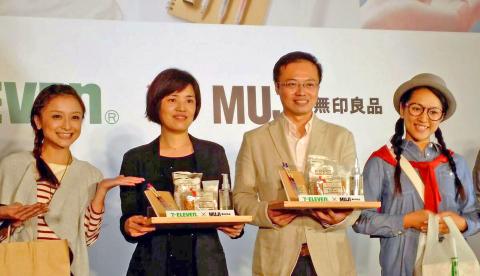President Chain Store Corp (PCSC, 統一超商), which operates the nation’s largest convenience store chain, 7-Eleven, yesterday said it plans to introduce products from Muji (Taiwan) Co Ltd (台灣無印良品) in a bid to fuel growth momentum.
PCSC started selling Muji products at 31 of its outlets by an in-shop model on Saturday.
PCSC said it aims to boost same-store commodity sales by 30 percent annually for those outlets selling Muji prodcts.

Photo: CNA
“The commodity sector has become one of the most important sales sources for 7-Eleven after PCSC adopted the strategy to expand store space,” PCSC director of e-business and commodities Jenny Shen (沈幸柔) told a media briefing.
Shen said the plan to introduce Muji’s products would help further diversify the company’s product lineup and bolster the growth momentum of its commodity section.
PCSC plans to introduce a total 140 items from Muji, with their average price at about NT$120, in the preliminary stage.
Muji Taiwan managing director Liang Yi-chia (梁益嘉) said the cooperation with PCSC may help the brand develop its retailing channels. Currently, Muji operates 33 stores in Taiwan and three virtual channels, including books.com.tw (博客來), 7net and Taiwan Rakuten Ichiba Inc (台灣樂天市場).
The company planned to sell more items at more 7-Eleven stores in the near future, Liang said, adding that Muji may sell exclusive products in the longer term, in line with its past experience in Japan.
In Japan, Muji sells some of its products in the convenience store chain operator FamilyMart Co Ltd, with certain exclusive items only available in this channel, he added.

RUN IT BACK: A succesful first project working with hyperscalers to design chips encouraged MediaTek to start a second project, aiming to hit stride in 2028 MediaTek Inc (聯發科), the world’s biggest smartphone chip supplier, yesterday said it is engaging a second hyperscaler to help design artificial intelligence (AI) accelerators used in data centers following a similar project expected to generate revenue streams soon. The first AI accelerator project is to bring in US$1 billion revenue next year and several billion US dollars more in 2027, MediaTek chief executive officer Rick Tsai (蔡力行) told a virtual investor conference yesterday. The second AI accelerator project is expected to contribute to revenue beginning in 2028, Tsai said. MediaTek yesterday raised its revenue forecast for the global AI accelerator used

TEMPORARY TRUCE: China has made concessions to ease rare earth trade controls, among others, while Washington holds fire on a 100% tariff on all Chinese goods China is effectively suspending implementation of additional export controls on rare earth metals and terminating investigations targeting US companies in the semiconductor supply chain, the White House announced. The White House on Saturday issued a fact sheet outlining some details of the trade pact agreed to earlier in the week by US President Donald Trump and Chinese President Xi Jinping (習近平) that aimed to ease tensions between the world’s two largest economies. Under the deal, China is to issue general licenses valid for exports of rare earths, gallium, germanium, antimony and graphite “for the benefit of US end users and their suppliers

Dutch chipmaker Nexperia BV’s China unit yesterday said that it had established sufficient inventories of finished goods and works-in-progress, and that its supply chain remained secure and stable after its parent halted wafer supplies. The Dutch company suspended supplies of wafers to its Chinese assembly plant a week ago, calling it “a direct consequence of the local management’s recent failure to comply with the agreed contractual payment terms,” Reuters reported on Friday last week. Its China unit called Nexperia’s suspension “unilateral” and “extremely irresponsible,” adding that the Dutch parent’s claim about contractual payment was “misleading and highly deceptive,” according to a statement

Artificial intelligence (AI) giant Nvidia Corp’s most advanced chips would be reserved for US companies and kept out of China and other countries, US President Donald Trump said. During an interview that aired on Sunday on CBS’ 60 Minutes program and in comments to reporters aboard Air Force One, Trump said only US customers should have access to the top-end Blackwell chips offered by Nvidia, the world’s most valuable company by market capitalization. “The most advanced, we will not let anybody have them other than the United States,” he told CBS, echoing remarks made earlier to reporters as he returned to Washington